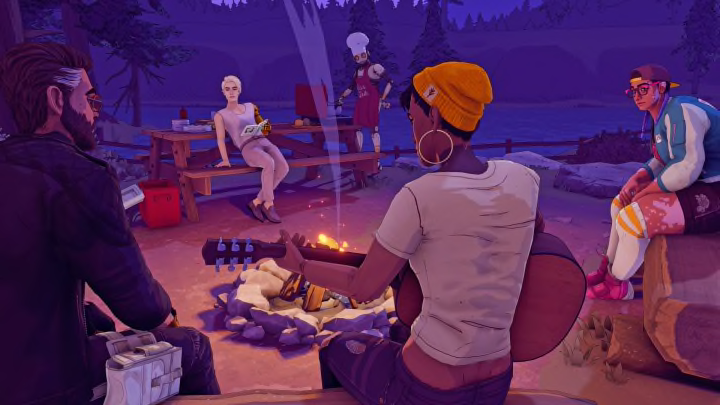‘Get over it or get lost’ Safiyya Ingar and Dominique Tipper discuss representation in games

There has been a lot of discussion about inclusivity and diversity in games, with writing consultancy firm Sweet Baby Inc. at the heart of it, despite simply being a writing consultancy firm. However, backlash against games with diverse casts precedes this current controversy, as the developers behind the upcoming rhythm action narrative game Dustborn know all too well. Meeting the team at PAX East, one developer revealed that the game received backlash following its announcement for featuring characters from various ethnic, cultural, and religious backgrounds as well as different sexual orientations.
We spoke to Dominique Tipper and Safiyya Ingar, actors who play the main characters Pax and Sai in Dustborn, to discuss representation in games, and how we can better include more diverse characters in our stories.
GLHF: Games like Dustborn are pushing for better representation of diverse characters. Do you see the same push happening in TV and film?
Dominique Tipper: In film, it yo-yos a lot, it depends on how the industry is doing. When things are going bad or the box office isn't doing well, a lot of people revert to a predominantly white cast because they believe it's safer. There's instances where it’s better [than usual]. There's instances where I think more people of color are at the helm of things than they were, but I still feel like there is an idea that safest is whitest.
Therefore, when there’s any panic, like with the strikes or with the pandemic, I see a lot more all-white casts coming out than there were maybe a couple of years ago, just after BLM. I never know how to answer that. Unfortunately, I think it rolls with the economy. I'm not sure about how gaming matches that. I just don't think it's as well-meaning as we would like it to be. I think you have to constantly push and fight to get stories told that are not white leaning because that's the only way to ensure that everybody gets seen and heard.
Safiyya Ingar: I think there’s a crossover between the two, not just the mediums but also the genre. There is a push for diversity, but what I hate and I will continue hating is why it feels like a brave statement. Why is it like, ‘Oh my God, we're trying to be inclusive!’ We just exist, man. The last time I checked, we were just here. I'm walking and living and breathing with the rest of you.
Why is there such a combative element to tell stories through a lens that isn't white-predominant when society isn't white-predominant? When you look around, you don’t only see white people. And then when you turn on your TV, you say ‘Oh, there's a brown person. I don't like that.’ Wait, What? Your neighbors are brown, your doctors are brown, your neighbors are Black, your doctors are Black. There's diversity literally everywhere.
I hate that it's peddled. Even the word diversity is used as some kind of bargaining chip like ‘Oh, we're gonna take this away from you, if you don’t act the way we want.’ I don't think people get a chance to fail because of that. We don't get that risk. We don't get the chance to go in and screw it up and then jump onto the next thing and make it better.
DT: That goes back to my point of this reversion to safety, because it's seen as ‘No one's going to go and see the film if there's a person of color in it or a woman lead.’ It’s so boring.
SI: Why am I hearing female voice actresses are getting death threats and their families get death threats because they're in a game and people don't like their character? It's one of those really messed up elements of this side of the industry. I've been a gamer for a long time. I love fandoms and fandom spaces, but for women and women of color, it is not safe because we literally can't even exist without people taking it as a threat on their lives, so they make a threat to ours, and it's abysmal.
Seeing the reactions to this game, I won't speak for the team, I'm only gonna speak for myself, but when we premiered at Gamescom, all the nastiness and the vitriol that I saw online, and it's like, ‘How does this actually affect you?’
Look around in this room [at PAX East] alone. At every angle, I can see 100 other games. Companies are trying their best to get their games and their projects off the ground. If you hate our project so much, [expletive] off. Don't play it. Leave it for the people that will love it and that will enjoy it. They will appreciate the hard work that we all put into this game. There’s passion and love that we all put into this game that you don't even have a pinky finger, and if you want to do better, go ahead and try. Go ahead and try like everyone out here.
All they're doing is trying their best to tell a story. If this one doesn't resonate with you, then off you jog. Don't make it a point to tell people how much they hate us, to tell people how much they despise our stories, despise our faces and despise pronouns and wokeness. What the hell is that all about? Last time I checked, you can just go on your merry way and let us continue with our stories and our openness and our pronouns. Because the last time I checked, living in a world where everyone feels safe and happy is something we should all strive for.
We all want to feel welcome, more safe and wanted. The world is such a dark place, especially right now. There is nothing that is gonna come from you keyboard bashing and being like, ‘I hate this game because Black people are in it.’ Wow, man, get a life. Get out your basement, get some air and go figure it out because you're not going to get any sympathy from me. We tried so hard and we worked our [butts] off for this game.
This game has been in the works for six years. It's beyond the scope of just us being cast, and coming here to promote it. It’s so much bigger. What's wonderful is seeing teams like Ragnar [creative director for Dustborn, Ragnar Tørnquist]’s team who went out of their way to do sensitivity testing, and culture workshops to make sure that they represent us. And they represent us fairly, not just as tokens, but as fully-rounded people. That's what these characters are.
Don't demonize the game because of that. If it really does offend you, get some therapy, you need some. The world is too far gone now for that to be your excuse. Get over it or get lost. I'm done. Sorry, I had to pop off a bit.
You spoke a bit about tokenism. What stops a character from being just a token?
DT: I do think it comes with how a character is written, and like as Saf says, going into the sensitivity and cultural aspect of things. Making sure that you're writing characters that are representative, and not just a stereotype of a culture. I don't think that any of the characters in [Dustborn] are that. I think that's the beauty of it.
Tokenism, for me, is a version of a stereotype. It's the idea of a culture or a people. Everyone, no matter what race you are, there's so many different people within that. No one Black person is the same, no East Asian person is the same. No one's the same. I think that often is what happens, especially with white people at the helm of writing it, they're just like, ‘Oh, well, all these Japanese people are the same.’ It's like, ‘No, I'm actually Korean.’ So I think specificity is also a thing, and I think everybody is very specific in [Dustborn]. To me, they're the things that separate one character, token or stereotypical character from another.
SI: Even the way we're dressed. I'm going to talk about Sai for a second and say I've never seen a Muslim South Asian character wearing shorts with a septum ring and dyed hair. But this is how messed up it's been for people like us. I don't get the luxury of playing characters that look like Sai, because in this day and age, we're still getting stereotyped and pigeonholed.
I walk into rooms and auditions, and I tell people I’m Muslim and they're like, ‘You don't look Muslim.’ I'm like, ‘What does that mean?’ Well, let's break it down. There are three white casting directors, two white producers, and one white writer. What does it mean that I don't look Muslim, because I went to Mosque for 10 years, my family are practicing, I practice Ramadan when it comes around. I am a Muslim. What do you mean?
Then I say, I'm South Asian. They're like, ‘You're South Asian?’ I'm like ‘Here we go again.’ What do you guys want from me? I'm not walking in with a bindi and a headscarf. Is that what you really wanted from me? For me, it represents both culture and identity. We're so different. We're all different and that's OK. Let us play the differences. With these characters, it's so much more well-rounded because you can see different sides of them.
There was a point where Sai used to drink in some earlier versions of the game and a bunch of Muslim beta testers must have flagged it up. And they changed the script. Sai doesn't drink anymore and it was as simple as that. How can we make Sai still in touch with their faith and their culture and not push them over to the edge of being basically not Muslim anymore.
There will be people that look at Sai and wouldn’t agree with her version of being a Muslim, and people that would look at me and wouldn’t agree with my version of being a Muslim. But that's the beauty of it. It's about your heart and soul and everyone is different in a different way, and that's the beauty of it all.
They let us have that. Having a team, a writing team, and a directing team, that lets you change the character, it's quite rare, and it's sad to say it's rare.
Dustborn will launch on PlayStation, Xbox and PC on August 20, 2024.
